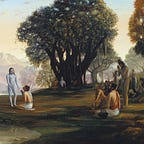Verses of the Taittiriya Upanisad are often quoted by Srila Prabhupada. Srila Baladeva Vidyabhusana also quotes several verses in the Govinda Bhasya and explains their conclusions. It is considered one of the eleven principal Upaniṣads. Although a relatively small book, it brings very deep knowledge about the nature of the absolute truth and our relationship with Him. The name "Taittiriya" comes from the Sanskrit word "tittiri", which means "partridge". This is connected with the story of the disciplic succession of the Yajurveda after Vyasa transmitted it to Vaisampayana.
Somehow, Vaisampayana became guilty of killing a Brahmana, which led his disciples to study the Atharva Veda and execute strict vows in order to free their guru from the sin. This led to the pastime of part of the mantras being vomited and collected by his disciples in the form of partridges.
The Yajurveda is divided into two main sections, the shukla (white) Yajurveda and the krsna (dark) Yajurveda. These names don't have to do with the topics discussed, but just with the organization. The white Yajurveda consists of sections of verses that are well-organized and categorized, while the dark Yajurveda is composed of verses that are not so well-organized and often appear to have little connection with each other. The Taittiriya-Samhita mentioned in the pastime is one of the four Samhitas that compose the dark Yajurveda.
The Taittiriya Upanisad includes chapters 7, 8, and 9 of the Taittiriya Aranyaka, which is associated with the Taittiriya-Samhita. These three chapters are called the Śikṣā-vallī, the Ānanda-vallī, and the Bhṛgu-vallī.
The name Śikṣā-vallī comes from the word siksa, which means education. This chapter transmits spiritual knowledge in the context of the education of students in the Vedic gurukulas. At first, the verses appear to invoke mundane blessings and give moral instructions, but a closer look reveals that they carry deep spiritual instructions.
The second chapter, the Ānanda-vallī, is centered around the description of the anna-maya, prāṇa-maya, mano-maya, vijnana-maya, and ananda-maya, discussing the evolution of consciousness of the conditioned soul, going from being absorbed into the basic needs of the body, all the way up to the platform of pure devotional service.
The final chapter, the Bhṛgu-vallī, explains the contents of the second chapter in the context of a conversation between Varuna and his son Bhṛgu, giving additional clarification and the final conclusions of the text.





